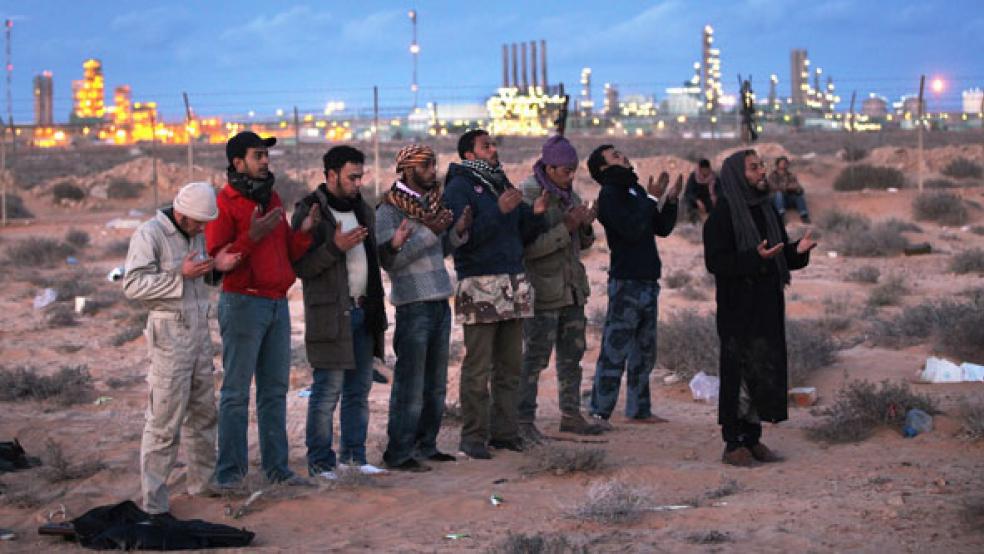The Mad Dog of Libya, Moammar Qaddafi, is dead.
Confirmed details are scarce; early reports suggested variously that he was “shot in the belly,” shot in the head, and “hit with a shoe” – the latter apparently a sign of disrespect.
The death of Qaddafi is excellent news for Libya, for his good pal Silvio Berlusconi, and for the world. The war has claimed more than 25,000 Libyan lives and produced untold misery in the country. But there may be a veritable pot of gold – black gold – at the end of the rainbow.
Mr. Berlusconi will rejoice, since he and his country badly need a boost. Italian companies have traditionally accounted for nearly one fifth of total Libyan fast-growing imports. Moreover, Italy has depended on Libya for 13 percent of its oil and 23 percent of its natural gas. The revolutionary fighting took a toll on both fronts. Perhaps the revival of Libyan demand will give that country a much-needed lift.
For the world overall, Qaddafi’s death (with equal amounts hard work and good luck) could usher in a new, moderate Islamic government, for which many in the country aspire, and which could provide leadership in a tumultuous region. Importantly, in the months ahead the country will likely restore oil production, which could be vital to keeping prices low and allowing consumers the world over a little breathing room.
The National Transitional Council had put off forming a government until the death of Qaddafi; they must now move quickly, to establish order and help rebuild their oil industry. None of this will be easy. The numerous competing tribal and religious factions are already arguing over allocating oil revenues and authority. That’s not surprising in a country where there is little other industry; last year, oil accounted for 95 percent of the country’s income. The rival tribes and parties will have to decide that the future of the country requires their partnership; stability will be essential to ramping up production.
Before the war, Libya produced about 1.7 million barrels per day, or 2 percent of world output. Though making up only a small percentage of global supply, the nation’s oil is especially light and sweet, making it particularly valuable to refiners. Further, Libya met much of Europe’s demand. Consequently, its loss disproportionately rattled markets. Output skidded to a near-halt during the intense months of fighting as many of the foreign oil companies and the engineers they employed fled the country.
Not only did Libya’s economy suffer, but the production drop contributed to the spike in oil prices earlier this year that dampened the global recovery. Though Saudi Arabia ramped up production to offset the shortfall, prices were nonetheless driven higher by uncertainty over OPEC politics. Iran and its aligned states wanted to push prices higher; the market, for a time, agreed.
Leaders of consuming nations in the west were so alarmed at the slowing impact of higher oil prices that they agreed in June of this year to release 60 million barrels of oil from reserves stockpiled to counter shortages. The move was a mistake; oil prices had been dropping for weeks before the announcement was made, and looked to be heading lower. The price of West Texas crude peaked in April at around $115 per barrel; softening growth in demand led prices steadily downward. Today’s price is $86. Though the reserves’ release may have cast a pall over the industry, it is generally not credited with the decline in prices.
As more territory was wrested from Qaddafi’s grip in recent months, oil industry participants began to return. Further encouraging their re-engagement was a statement from the National Transition Council that it will honor the terms of existing production contracts. Ratings agency Fitch responded to this reassurance and the more positive outlook by taking a more sanguine view of the credit outlook for Italy’s ENI and Austria’s OMV – companies especially hard hit by Libya’s output disruptions.
France’s Total, ENI and the German oil and gas company Wintershall have all begun to restore production, raising hopes that the damage to Libya’s oilfields is less severe than expected. OPEC has projected that Libya will be producing one million barrels per day within six months and be back to full production by the end of next year; others are more cautious. Their less confident outlook has more to do with security threats, absent personnel and politics than the state of the oilfields (though there are conflicting reports on that front).
The next few months will be crucial for Libya. The country will need – and will receive -- support from the international community in rebuilding its oil installations and its infrastructure. More importantly, it will need help in establishing a functioning government. Let us hope that the former aids the latter, to the benefit of the Libyan people. After 42 years of political starvation, they should know the taste of freedom.






